|
|
|
Sort Order |
|
|
|
Items / Page
|
|
|
|
|
|
|
| Srl | Item |
| 1 |
ID:
133482
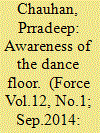

|
|
|
|
|
| Publication |
2014.
|
| Summary/Abstract |
As the world entered the last couple of decades of the 20th century, the sharply differing views and reactions of India and the United States (US) to unfolding global and regional events had brought bilateral relations to almost the nadir of the Nixon years. As James Heitzman and Robert L. Worden, the Washington-based editors of India: A Country Study have recorded (http://www.countrystudies.us/india/134.htm), "In the 1980s the Indian and United States governments had divergent views on a wide range of international issues, including Afghanistan, Cambodia, the Middle East, and Central America. Serious differences also remained over the US policy toward Pakistan and the issue of nuclear proliferation. India was repeatedly incensed in the Eighties when the US provided advanced military technology and other assistance to Pakistan despite the US' concerns about Pakistan's covert nuclear programme. For its part, Washington continued to urge New Delhi to sign the Treaty on the Non-Proliferation of Nuclear Weapons and, after the successful test launch of the Indian Agni intermediate-range ballistic missile in May 1989, called on New Delhi to refrain from developing a ballistic missile capability by adhering to the restrictions of the Missile Technology Control Regime". This unhappy prelude makes the vibrancy of the India-US bilateral defence relationship in general (and the maritime relationship in particular) over the very next decade all the more striking.
|
|
|
|
|
|
|
|
|
|
|
|
|
|
|
|
| 2 |
ID:
133694
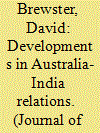

|
|
|
|
|
| Publication |
2014.
|
| Summary/Abstract |
India and Australia have the potential to become important strategic partners in Asia as part of a coalition that could help manage the changing balance of power in the region. But while India and Australia share many strategic interests, both countries still have a lot to learn about how to get along with each other. Some might even see them as the odd couple of the lndo-Paci?c. This paper looks at recent developments in the relationship in the areas of security, politics and economics, and the prospects for a closer partnership under the new Modi government.
|
|
|
|
|
|
|
|
|
|
|
|
|
|
|
|
| 3 |
ID:
133896
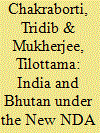

|
|
|
|
|
| Publication |
2014.
|
| Summary/Abstract |
India has always shared a convivial relation with Bhutan. This article traces the historical background of the bilateral relations, attempting to investigate why Bhutan, despite being tiny in size, is so important even after the change of Government in India. Pragmatically, the new Prime Minister of India, Narendra Modi, stated his foreign policy by selecting Bhutan as his first trip abroad. What are the promises that Modi has made to Bhutan? Who all have raised objections to Modi's plans for Bhutan and why? How important is the China factor in developing the India-Bhutan relations?
|
|
|
|
|
|
|
|
|
|
|
|
|
|
|
|
| 4 |
ID:
133906
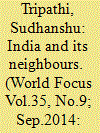

|
|
|
|
|
| Publication |
2014.
|
| Summary/Abstract |
Foreign Policy of any country should be so framed that relations with neighbours should be given the highest priority because that, to a great extent, determines the country's standing in the comity of nations. Obviously, India's emergence as a regional power and a key global player also depends on its image and standing in the neighbourhood of the South Asian region. Fortunately, the new Indian government under Narendra Modi's dispensation has taken certain reasonable steps towards forging closer ties with all of its neighbours in the subcontinent.
|
|
|
|
|
|
|
|
|
|
|
|
|
|
|
|
| 5 |
ID:
148561
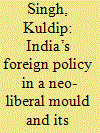

|
|
|
|
|
| Summary/Abstract |
The present paper examines the conduct of India’s foreign policy in neo-liberal paradigm in the post Soviet phase. It looks at forces which resulted in what is called the transition from Cold War era to post Cold War period. It also analyses how Modi Government in search of more intensified engagements with the US, with which its global activism is closely linked, has tried to recast non-alignment. It is argued here that the traditional notion of nonalignment which was seen at odds with close engagements with the US is being shed in a big way though the strategic autonomy is still a key pursuit of India.
|
|
|
|
|
|
|
|
|
|
|
|
|
|
|
|
| 6 |
ID:
142141
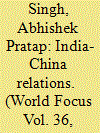

|
|
|
|
|
| Summary/Abstract |
India's trade deficit with China is set to reach record levels in 2015, new trade figures show, with the imbalance after the first three quarters of the year already nearing last year's mark. As India has grown its consumers and corporations have been importing an increasing amount of China’s affordable products but India’s exports to China have not kept pace. While China has a cost advantage in most products, analysts say India is very competitive in the pharmaceutical, textile and some services sectors. That is where it needs more access if it wants to start to rectify the skewed trade balance. Similarly, frictions along the border and Chinese incursions mounted in recent years remain a serious security concern for India. This provides ample scope for anti-China constituency in India. Also China’s solidarity with Pakistan has wider ramifications, especially from an Indian standpoint towards bilateral relations.
|
|
|
|
|
|
|
|
|
|
|
|
|
|
|
|
| 7 |
ID:
133905
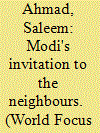

|
|
|
|
|
| Publication |
2014.
|
| Summary/Abstract |
"A resurgent India must get its rightful place in the comity of nations and international institutions. The vision is to fundamentally reboot and reorient the foreign policy goals, content and process, in a manner that locates India's global strategic engagement in a new paradigm and on a wider canvass, that is not just limited to political diplomacy, but also includes our economic, scientific, cultural, political and security interests, both regional and global, on the principles of equality and mutuality, so that it leads to an economically stronger India, and its voice is heard in the international fora.
|
|
|
|
|
|
|
|
|
|
|
|
|
|
|
|
| 8 |
ID:
133900
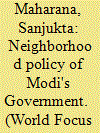

|
|
|
|
|
| Publication |
2014.
|
| Summary/Abstract |
India is surrounded by many big and small countries and to maintain cooperative, collaborative and peaceful relations with the neighboring countries is an important principle of foreign policy of India. India's centrality in the region needs a balanced and cooperative approach in India's neighborhood policy. The Kashmir problem, dealing with nuclear Pakistan, Sir Creek and Siachen disputes, water conflict, problem of terrorism, Tamil problems, fisherman problem, border problem are various complicated issues which have to be dealt by an effective foreign policy module of the NDA government. The real test of dealing with countries will be judged during the time of crisis. So an effective crisis management structure is necessary for effectively managing crisis situations with the neighboring countries.
|
|
|
|
|
|
|
|
|
|
|
|
|
|
|
|
| 9 |
ID:
133670
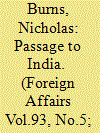

|
|
|
|
|
| Publication |
2014.
|
| Summary/Abstract |
In the century ahead, U.S. strategic interests will align closely with those of India, and so keeping the U.S.-India relationship strong is crucial. The Obama administration needs to make Delhi a higher priority.
|
|
|
|
|
|
|
|
|
|
|
|
|
|
|
|
| 10 |
ID:
133566
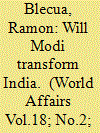

|
|
|
|
|
| Publication |
2014.
|
| Summary/Abstract |
Rising above the controversies that have surrounded him since he became Chief Minister of Gujarat, Narendra Modi the new Indian Prime Minister has embarked on an ambitious programme of economic reforms at home and of active diplomacy and cultural projection abroad. According to Ramon Blecua, with his background and reputation as a Hindu nationalist, Modi appears to be striving for a careful mix of economic liberalisation and socially inclusive provisions.
|
|
|
|
|
|
|
|
|
|
|
|
|
|
|
|
|
|
|
|
|